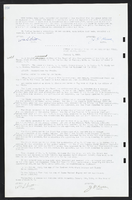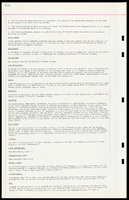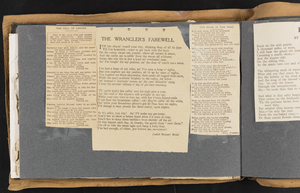Search the Special Collections and Archives Portal
Search Results

Charlotte Hill Papers
Identifier
Abstract
The Charlotte Hill Papers (1975-1996) document Charlotte Hill’s commitment to the Las Vegas, Nevada community and especially to the local PBS affiliate, KLVX Channel 10. The majority of the collection relates to KLVX Channel 10 and the work of the Friends of Channel 10 on behalf of the station, in particular information about fundraising events and volunteers. It also contains material related to Hill's membership in national organizations associated with public broadcasting. The collection includes some material about her work with the American Camping Association and the Las Vegas Sun Summer Camp Fund.
Archival Collection
Ralph Roske Papers
Identifier
Abstract
The Ralph Roske Papers (1957-1989) consist of Ralph Roske's book manuscripts, lecture notes, and correspondence. The collection includes extensive lecture notes on the United States Civil War, United States history, and Nevada history. It also includes Roske's research and manuscripts on Nevada, California, and the United States Civil War, as well as student
papers. Ralph Roske was a professor of history at the University of Nevada, Las Vegas (UNLV).
Archival Collection
University of Nevada, Las Vegas Creative Services Records (2000s)
Identifier
Abstract
This is part 4 of 6 finding aids for the University of Nevada, Las Vegas Creative Services Records and represents 2000 to 2009. Generally, materials are transferred from UNLV Photo Services to UNLV Special Collections and Archives 5 years after they are created. For materials within the last 5 years, contact photo@unlv.edu or call 702-895-3036. This finding aid contains the contact sheets and digital files produced by the University of Nevada, Las Vegas from 2000 to 2009 as an official record of the institution's development, activities, and community. Clients include UNLV colleges and departments, the University's administration, the UNLV Foundation, athletic departments, and the Nevada System of Higher Education (NSHE). Images include academic activities, athletic events, faculty and administration, student life, campus life, campus development, architecture, and public relations.
Archival Collection

Patricia Vazquez interview, November 14, 2018, June 14, 2019: transcript
Date
Archival Collection
Description
Session 1: Interviewed by Marcela Rodriguez-Campo. Barbara Tabach also participates in the questioning. Session 2: Interviewed by Rodrigo Vazquez. Monserrath Hernandez also participates in the questioning. Patricia Vazquez was born and raised in Las Vegas, NV and shares her experiences growing up in the Valley as a Queer Latina. At a young age, she remembers traveling back and forth between Mexico and the U.S. to visit family. When she started school she shares how her home language, Spanish, became her family's "secret language" as she began to learn English. During elementary school Patricia was tracked into the special education program, and remove from the mainstream classroom. She would find her love for learning in books and libraries as she taught herself how to read in English. Despite being tracked into less advanced courses, Patricia would end up taking AP/ Honors courses in high school after forging her favorite teachers signature, which changed her educational trajectory. After coming out to her family, Patricia went nearly a decade distanced from her mother and continued her college education at Arizona State University. There, she would complete a bachelors in painting and a masters in comparative literature. Her work with the Chicano Studies program at ASU helped her develop her Chicana identity and begin her involvement in social activism. In Las Vegas, she worked to fight for marriage equality and LGBTQ rights with the American Civil Liberties Union , and later with the Progressive Leadership Alliance of Nevada. She also conducted several lectures for the Latino Youth Leadership Conference on sexuality, gender, and homophobia for over a decade. She has served as an English Professor at the College of Southern Nevada for the last 20 years and is an avid hiker, traveler, and painter.
Text

Transcript of interview with Patricia Mulroy by Stefani Evans and Claytee D. White, January 03, 2017
Date
Archival Collection
Description
Patricia Mulroy served Las Vegas as the general manager of the Las Vegas Valley Water District from 1989 to 2014. She served the state of Nevada as the general manager of the Southern Nevada Water Authority from 1993 to 2014. Patricia helped to build the Authority, and saw the state through the devastating drought of the Colorado River. Patricia was born in Frankfurt, Germany on February 24, 1953. As a young girl, she lived in several different countries, but always felt that the United States was her home. Her experiences abroad fed her to develop a fascination with government work and state service. She arrived in Nevada in 1974 to attend UNLV. In 1989, Patricia became the general manager of the Las Vegas Valley Water District. She entered the field at a tumultuous time, facing the drought of the Colorado River and tension within the districts. She pioneered the Water Authority, which revolutionized Southern Nevada’s water rights system and allowed the districts to deal with the issue cooperatively. She worked with other Southwestern states and Mexico to support Las Vegas and Nevada through the drought. Patricia retired in 2014, but has chosen to remain active in politics and business. She is currently working with the World Bank in China on the World Economic Forum. She is also a nonresident Senior Fellow at the Brookings Institute, a faculty advisor for the Desert Research Institute, and a board member of the Wynn Board of Directors.
Text

James L. Hogan interview, March 11, 1978: transcript
Date
Archival Collection
Description
On March 11, 1978, collector Patty L. Baratti interviewed James Hogan (born April 6th, 1909 in Winton Place, Ohio) at his home in Las Vegas, Nevada. In this interview, Hogan talks about his time working with the telephone company in Arizona and moving to Las Vegas, Nevada. He discusses his time working on grazing rights and cattle ranching in Nevada and how planning went to ensure that farms were able to have land to graze their animals. He speaks about dealing with farmers, corporations, and the government and the frustrations he had to deal with before there were set laws about grazing. He also discusses the change from mainly family farms in Nevada to corporations owning much of the farmland.
Text



